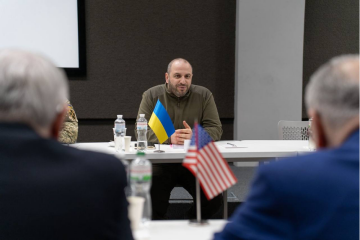The effectiveness of the Ministry of Defense under the leadership of Rustem Umerov is facing criticism from both Ukrainian society and Western partners: the head of the agency is accused of management chaos, procurement from dubious firms at inflated prices, and politically motivated staffing policies. A recent investigation by “Mirror of the Week” highlights serious management issues threatening the country’s defense capabilities during this critical period of war with Russia.
Subscribe to our Viber: news, humor, and entertainment!
SubscribeThe situation becomes threatening in light of the recently presented strategic documents by Ukraine's President Volodymyr Zelensky – the Resilience Plan and the Victory Plan. The success of both plans depends on the effectiveness of the Ministry of Defense in providing the army with resources, attracting Western investments to the defense sector, and conducting effective military diplomacy.
However, analysts note that Minister of Defense Rustem Umerov, who has held the position for over a year, has not demonstrated any progress in key areas. The main issues revolve around management chaos, sabotage of reforms, and poor coordination with international partners.
Procurement: centralized chaos or deliberate sabotage?
One of the most painful issues remains defense procurement. Since Umerov's tenure began, scandals have continued in the ministry regarding attempts to liquidate the Defense Procurement Agency (DPA). The decision to dissolve it, allegedly dictated by NATO standards, was only revoked after public and partner pressure.
Popular articles now Ready for mobilization: how many servicemen are left in Ukraine Does forced mobilization threaten Ukrainian women: TCC explained who among women will receive summons Higher education will become a privilege for the chosen: universities will change their approach to education Cars will become an unaffordable luxury: fuel prices will be set differently Show moreHowever, as of the end of November, the supervisory board of the DPA has yet to begin its work due to bureaucratic formalities. As a result, there is a risk of politically motivated dismissal of DPA head Marina Bezrukova, known for her principled stance.
Furthermore, the special exporters remain unreformed, dealing with weapon supplies at inflated prices and through intermediaries. Despite the minister's loud statements, there have been no results in eliminating corruption schemes so far.

Conflicts of interest and management chaos
In addition to procurement issues, journalists note that the Ministry of Defense is plagued by duplication of departmental functions. The Department of Military-Technical Policy (DMTP) continues to handle part of the defense agreements despite the establishment of new structures. Key positions still feature individuals previously involved in corruption scandals.
Critics of the minister also point out excessive and questionable “delegation of responsibility.” Most key areas are overseen by his deputy Dmitry Klimenkov, a close friend and business partner of Umerov. This includes procurement, management of Ministry of Defense lands, capital investments, and dealings with state enterprises. Such centralization creates high risks of corruption.
Turkey's influence: a challenge for international cooperation
Particular concern is raised by the close ties between the Ministry of Defense leadership and Turkey. Advisors to the minister, who hold no official positions and lack access to state secrets, effectively influence strategic decisions crucial for the country's defense capabilities and participate in international negotiations. Journalists report that these individuals may hold Russian passports, casting doubt on their loyalty.
Documents obtained by journalists from business registries in the USA, Turkey, Ukraine, Panama, Russia, Kyrgyzstan, South Africa, Estonia, Tunisia, Canada, and other countries confirm (see documents) that Snaver Seytkhaliyev, Lenur Mambetov, and Rustem Umerov have been reliable business partners in structures linked to Turkish investments and influence in Ukraine for nearly two decades.

This close cooperation between Ukraine and Turkey in the field of arms production, including a joint project to create the KAAN fighter jet, also raises concerns from the USA. Washington is closely monitoring Turkish-Russian relations and expresses distrust toward any initiatives that may jeopardize their defense technologies.
As the investigation by “Mirror of the Week” indicates, the activities of the Ministry of Defense under Umerov's leadership are accompanied by numerous conflicts of interest, weak coordination, and the risk of reform failure. Amidst the war, these issues could have threatening consequences not only at the domestic level but also in the realm of foreign policy, as the trust of international partners in the Ukrainian defense sector remains critically important.
Sabotage and chaos within the Ministry of Defense are evolving into a systemic problem that could jeopardize the implementation of Zelensky's strategic plans, investigators summarize. Consequently, the country requires immediate and decisive actions to restore trust both domestically and from Western partners.